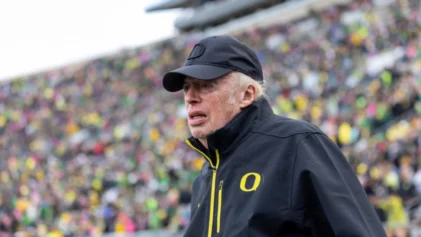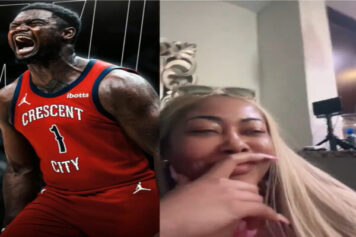Zion’s blown Nike exposes the often one sided relationship between the sneaker industry and young men of color.
The power of Zion Williamson was on full display on Thursday night despite leaving the game after 36 seconds. The 88-72 North Carolina win was a mere footnote, overshadowed by the fan and social media frenzy that Williamson’s exploding Nike sneaker and subsequent injury created.
According to reports, hours after Nike released a statement saying that they “are working to identify the issue,” the company’s shares had dropped by about 1%, for a loss of $1.12 billion.
The Zion Effect can make people around him rich, but it can also cripple those same parties. It’s exactly why Zion is an economy by himself, one that everyone wants a part of.
Nike’s stock dropped by about 1% the morning after Zion’s shoe broke. @darrenrovell reports that’s an “on-paper loss of $1.12B" 😳
📷: @orunychoi pic.twitter.com/4UKYEs2TCR
— Yahoo Sports (@YahooSports) February 21, 2019
The mishap occurred right in front of former President Barack Obama, one of the many prominent people in attendance to see the “8th Wonder of the World.”
The shoe – a Nike PG 2.5 PE – soon became the focus after Williamson left the game.
Nike is investigating the situation, but the damage has been done, opening the door for competing brands to play off of Zion’s unforgettable sneaker explosion.
Nike releases statement following Zion Williamson’s sneaker mishap: pic.twitter.com/oLTeQ7Z1yG
— Ryan Field (@RyanFieldABC) February 21, 2019
Regardless of the brand, sneakers that explode are perceived as cheaply made. For a billion dollar brand such as Nike to have this happen on a national stage is beyond serious. It exposes how easily a billion dollar dream depending on a player’s health can go awry. How delicate and potentially-disastrous these deals are for all parties involved and why players of Zion’s magnitude deserve a bigger piece of the pie upfront.
"These jerseys and things that are selling because of Zion, he should get some of that. He brought President Barack Obama to the game, Floyd Mayweather, Spike Lee. … Why does Mike Krzyzewski have a Nike deal? It's just a lot of hypocrisy." — @Chris_Broussard pic.twitter.com/yFeUNE04BA
— UNDISPUTED (@undisputed) February 21, 2019
He almost went from billion dollar baby to $8 million dollar tragedy in a few seconds.
Sources: Duke paid for Zion Williamson’s insurance policy, as schools are allowed to do. Premium for a $8 million loss of value policy runs around $50,000.
— Darren Rovell (@darrenrovell) February 21, 2019
According to Forbes, “The global athletic footwear market size is expected to reach $95.14 billion by 2025, according to a new report by Grand View Research Inc. Much of the sales are motivated by a sneaker’s identification with a specific athlete. This cachet or “cool factor” especially drives the sales from a younger market.”
Those numbers don’t include the lucrative underground market that also drives sneaker sales.
As transcending a player as Zion is, there’s a multi-faceted hype machine that works in conjunction to make him the most polarizing figure in sports and position him for insane endorsement deals and elite branding endeavors.
The university has to court him for one season. The coaches have to make sure he’s comfortable and shining. The major sneaker companies start to groom him for a mega-deal well before he’s selected as the No. 1 pick in the Draft. Then, the League and the city that drafts him prepares to capitalize on the earning potential of “The Zion Effect”.
All of these mechanisms rely on Zion remaining healthy.
If he gets hurt, everything is lost. That’s why so many people are suggesting that he shut it down for the season.
The Blue Devils have a sneaker deal with Nike, so Zion wears those kicks at the games. Duke is four years into a 12-year deal with Nike as the exclusive supplier of uniforms, shoes and apparel. Nike has had an exclusive deal with the university since 1992. Therefore, Zion’s admirers and the young kids that fuel the sneaker business buy those shoes too — on the strength of him. It’s almost impossible to put a monetary figure on it, but Zion could live three lifetimes and possibly still not make back the money he generates for the businesses around him.
“For a shoe to fall apart – completely fall apart – came in one of the most highly anticipated games in a long time,” legendary sports executive Sonny Vaccaro told USA TODAY. “This magnifies it. There was no NBA game going on and Zion had as much hype as anyone in a while. Tickets were going for thousands of dollars. The moon and the stars aligned and everyone in the world saw it.”
The cheapest ticket for UNC vs. Duke is $2,990.
The reason? Zion Williamson.
The freshman sensation has set the online ticket resale market on fire: https://t.co/mtLhgaqUK4 pic.twitter.com/EopAq7D5lS
— The Sporting News (@sportingnews) February 19, 2019
Hoops OG Vaccaro is known as the Godfather of the sneaker deal, spearheading the revolution of shoe contracts with pro ballers back in the 80s. He altered the landscape of shoe deals while at Nike, Adidas and Reebok. Vaccaro says he’s only seen a sneaker explode one time.
It only took one time for Williamson to injure himself severely enough to have to leave the game. If it was a torn ACL or meniscus, Nike would be answering some serious manufacturing questions and we’d be looking at another dream deferred.
Watching Zion go down tonight is exactly why we wrote this story earlier. The Zion Effect creates success for everyone around him, but the risks are high, guarantees & protections low, for student athletes like Zion. It needs to change. https://t.co/qoIeaOd7E9
— The Shadow League (@ShadowLeague) February 21, 2019
Zion’s impact on the sports world has been referred to as “Tiger Woodsesque”. He’s blossomed into an elite celebrity and hasn’t even played a game in the NBA yet. Nike claims to be the leading brand for athletic performance and safety, so Zion’s injury is a terrible look for the company and it’s no surprise that the stock dropped.
Nike failed to support the #1 ranked team and the No. 1 entity in college basketball. The players are too valuable, the money is too colossal and the moment is too fleeting for so many athletes who never wind up getting their proper compensation for helping universities and coaches secure lucrative sneaker deals with companies like Nike.
A company which has made billions off of young, black talent.



